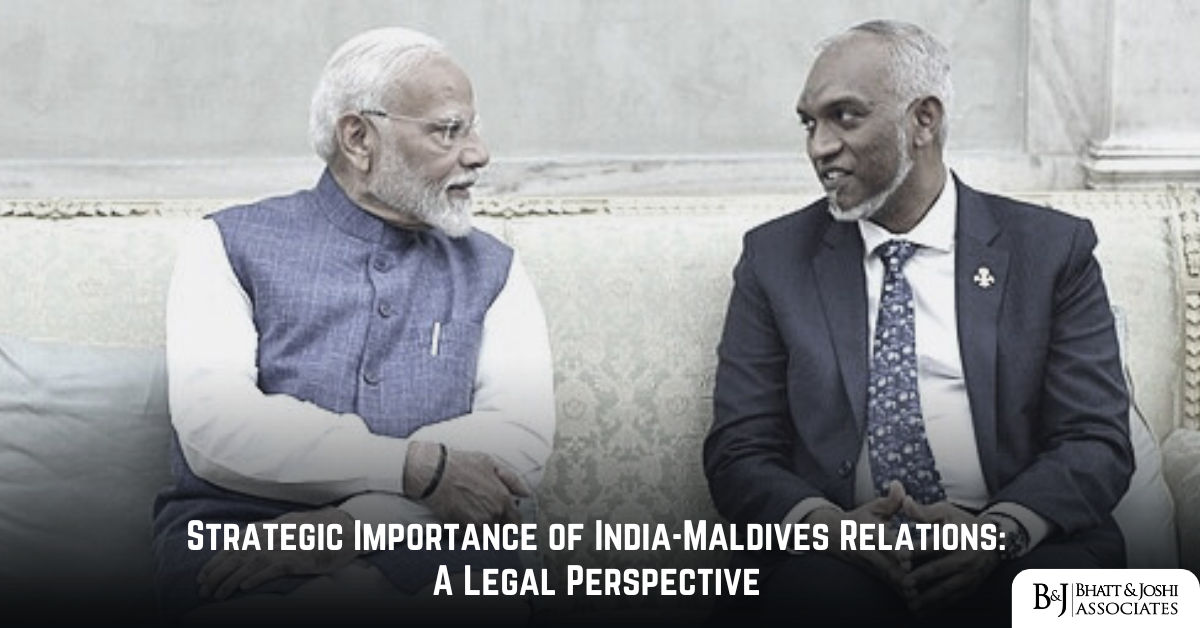Introduction
India and Maldives share a unique relationship shaped by geographic proximity, historical ties, and mutual strategic interests. The Maldives, which is located in the Indian Ocean, occupies a very important place which connects the important sea routes emerging in this region. India, which is heavily dependent on maritime trade, relies on the stability and cooperation of these neighbours to guarantee regional security and economic prosperity. For Maldives, India’s diplomatic and developmental assistance is always of help. This article attempts to analyze the strategic importance of India-Maldives relations with particular emphasis on the relevant legal instruments, treaties, and case laws.
Historical Foundations of India-Maldives Relations
The historical link between India and the Maldives dates back to ancient times when there was trade as well as cultural exchange and cooperation. After the Maldives gained independence in 1965, India was one of the first countries to establish diplomatic relations, as both India and Maldives understood their strategic importance.
In 1988, the bilateral relations took a new dimension when India’s Operation Cactus successfully countered a coup attempt in Maldives. This military action by India showcased her determination to ensure the political stability of her neighbours. In the past decades, India has provided consistent economic and developmental aid, which strengthened the bilateral relations. The exchanges in culture and the shared heritage of South Asia have strengthened the relations further given their respect and understanding.
Strategic Importance of the India-Maldives Relationship
As a key participant in maritime defence and regional geopolitics, the Maldives assumes a critical role in the Indian Ocean. Its 26 atolls, which occupy an area of over 90,000 square kilometres, are located on important international shipping routes linking the Middle East to Southeast Asia. Dominance in this part of the world can greatly affect international trade as well as the energy supply chains. The Maldives is much more than a passive geographic feature; it has emerged as a focal point in contests for influence among global powers on the Indian Ocean rim.
For India, the Maldives figures prominently in the security of the southern periphery of the country. India’s maritime security policy depends on preventing foreign countries from dominating its immediate neighbourhood. The Maldives’ assistance is important for fighting piracy, human smuggling, and illegal fishing in the Indian Ocean. In addition, the ballooning geopolitical competition in the Indo-Pacific region serves to heighten India’s interest in the Maldives.
Legal Frameworks Governing Bilateral Relations
India and Maldives relations are sustained by treaties and international customary law, including other legal facets. The nations are bound by numerous frameworks which help govern their relations in a way that ensures mutual respect and sovereignty.
The diplomatic relationship between the two countries was established with the signing of the Treaty of Friendship in 1966. This treaty provided for peaceful co-existence and mutual respect, thus paving the way for subsequent agreements between the two countries. In 1976, the two countries entered into a Maritime Boundary Agreement by which both sovereign states contracted to respect each other’s maritime boundaries. This agreement marked an important step in achieving certainty as to resources, jurisdiction, and disputes while due regard was rendered to international maritime law.
The underlying principle of defence cooperation agreements has also shaped the ties of the two countries. The agreements signed in 2009 and later in 2021 were directed towards strengthening the two countries’ operative capabilities through the enhancement of maritime security and intelligence sharing. Cultural and economic integration has been aided by visa agreements that allow citizens to freely move, while investment treaties guarantee the protection of business interests of both sides.
Role of International Law
While international laws govern the relationship between the Maldives and India, it is the maritime domain which matters most. Both countries are parties to the United Nations Convention on the Law of the Sea (UNCLOS) which deals with maritime boundaries, sharing of resources, and ecosystem conservation. The principles of UNCLOS are intended to foster cooperation among states by providing means to avoid conflicts through the proper utilization of oceanic resources.
Apart from the International Maritime Organization (IMO), other multilateral organizations also act for the governmental part of the relations. International maritime law includes such aspects as anti-piracy activities, pollution and protection of communication routes. The Maldives and India have often synchronised their positions on maritime affairs on international platforms, demonstrating a common desire for peace and stability within the Indian Ocean.
Judicial Precedents and Dispute Resolution
Even though India and Maldives have been relatively peaceful, the means to resolve disputes rests with international law and bilateral treaties. Case law and jurisprudence may provide examples of how such matters could be dealt with.
The 2014 India-Bangladesh maritime boundary arbitration and the Somalia/Kenya case in 2021 stand as examples of previous disputes which set the benchmark for possible arbitration disputes between India and Maldives. These examples highlight the necessity to follow the principles of UNCLOS as well as illustrate that legal action is available to guarantee fairness. Moreover, the Indian Supreme Court ruling on extraditions, like in the case of State of NCT of Delhi v. Union of India, also shows how India is bound by the rule of law in international relations.
Key Challenges in India-Maldives Relations
Even with deep connections with India, Maldives has issues with India which sometimes raises bilateral tensions. Political instability in Maldives is their major problem. With every regime change, there is always a foreign policy change. For example, during the rule of Yameen, China was his friend and as such had a pro-Chinese foreign policy. His appreciation towards China makes it difficult for India too as other powers want to meddle in the Maldives and make it a chess piece.
Maldives becoming more pro-China makes it difficult for India. India’s perception of Maldives changed when infrastructure projects were sponsored by Chinese BRI. India has fears of debt domination of the Maldives and militarization of the Indian Ocean. In addition, environmental problems like persistent sea level rise endanger the Maldives. Multilateral approaches and legislation focused on the protection of environmental development are needed to deal with this situation.
Legal Mechanisms to Address Challenges
Both countries have used legal and diplomatic solutions to these challenges. One of the focus areas has been the enhancement of defence cooperation accords. India has donated patrol boats and has set up radar stations in the Maldives for better security and defence at sea. These steps are based on sovereign law, giving a guarantee of protection on trust, and more importantly sovereignty.
Economic relations have been very important too. India’s credit of USD 400 million for infrastructure development through a line of credit and business loan is poured under the framework of investment treaties and thus has transparency and mutual advantage. Also, other such agreements, like the Paris Agreement dealing with climate change and sustainability do set boundaries for joint actions and engagements.
Case Studies Highlighting Bilateral Cooperation
Operation Cactus in 1988 serves as an example of India’s commitment towards the sovereignty and stability of the Maldives. This military intervention is often cited by legal scholars as one of the ‘permissible interventions’ under the principle of consent in international law. Likewise, India’s response to the Malé water crisis in 2015 was also an example of effective disaster management and humanitarian action governed by customary international law.
Joint maritime exercises such as Exercise Ekatha are examples of compliance with defence pacts and also serve to deepen confidence. Besides achieving the purpose of enhancing operational readiness, these exercises also serve to reassert the commitment of the two countries to regional security and international legal order.
Future of India-Maldives Relations
India-Maldives relations need to develop further by the shifts in geopolitics. Its legality, as well as judicial precedent, will determine increasingly how these nations interact with one another. Strengthening regional institutions such as the Indian Ocean Rim Association (IORA) can facilitate multilateral dialogue and cooperation.
To counter outside influence, India must work on its strategic and economic relations with Maldives. The introduction of new legal instruments, including refreshed maritime cooperation and investment guarantee contracts, would assure stability for a longer time. Furthermore, enhancing the connection between the two countries through cultural and educational programs will help foster bilateral relations even more.
Conclusion
One must pay attention to the diplomatic significance of the India-Maldives relations. While there are some challenges to overcome, respecting international law along with diplomatic efforts is a key to untangling the web and reinforcing the relationship. India’s and Maldives’s legalistic approaches toward problem-solving can protect interests and sustain growth in the Indian Ocean region. It illustrates the degree of cooperation and partnership that these countries share, thereby forming a foundation for peace and stability in the world which is changing at a rapid pace.














